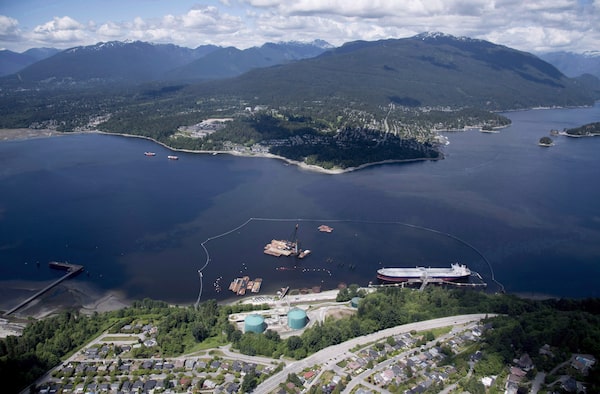
Aerial view of Kinder Morgan's Trans Mountain marine terminal, in Burnaby, B.C., on May 29, 2018.JONATHAN HAYWARD/The Canadian Press
Members of the public will be turned away from hearings to reconsider approval of the Trans Mountain pipeline expansion project for security for security reasons, the National Energy Board says.
The federal authorization for the project was quashed by the courts over inadequate consultation with Indigenous communities and failure to consider the impact of the project – now owned by Canadian taxpayers – on endangered killer whales in the Salish Sea.
An NEB panel is scheduled to hear three weeks of Indigenous traditional testimony beginning on Nov. 19, with sessions in Calgary, Victoria and Nanaimo.
“Experiences at previous board hearings, which have included physical and verbal threats against hearing attendees and participants requiring intervention by security and law enforcement staff, combined with security assessments for the upcoming oral hearing sessions, have given the board reason to limit access to the hearing room,” the NEB announced in a statement.
NEB hearings in Toronto on an Enbridge Inc. pipeline application were suspended in 2013, when protesters stormed the proceedings. A similar protest against the Energy East pipeline proposal shut down hearings in Montreal in 2016.
Access to the hearing rooms this month will be limited to those who are presenting evidence, members of their communities, registered intervenors, Trans Mountain officials and accredited media. In lieu of public access, the NEB will provide live audio streams and transcripts of all sessions.
Eugene Kung, a staff lawyer with West Coast Environmental Law, called those limits unjustified.
“They are hiding behind an inflated sense of danger, it is very concerning,” he said on Thursday. “These are supposed to be public hearings that demonstrate transparency and accountability.”
He noted this is not the first time the NEB has restricted access to its proceedings. In 2016, Mr. Kung was an intervenor at hearings in Burnaby on the original application for the Trans Mountain pipeline expansion. He recalled that the private security force outnumbered the few citizens who got in. “We were in this almost completely empty ballroom, while the public was outside, protesting peacefully.”
The Trudeau government has given the NEB a tight timeline to reconsider its approval of the project, with a final report to cabinet due by Feb. 22. The panel is restricting the hearings to new information related to the impact of marine shipping related to the project between the Westridge Marine Terminal in Burnaby and Canada’s 12-nautical-mile territorial sea limit. That includes the important feeding grounds for the southern resident killer whales in the Salish Sea. Vessel noise, pollution and a diminishing number of Chinook salmon – their prime source of food – have contributed to the whales' decline to the point that just 74 are left.
The Squamish Nation, backed by the B.C. government, is seeking additional time to prepare its case, saying new information filed by Trans Mountain – more than 8,000 pages – will take some time to review.
Khelsilem, a councilor and spokesperson for the Squamish Nation (who uses only one name), said the experts that his community is consulting cannot prepare opening statements and evidence by Nov. 20, as required by the NEB. The Squamish want another 15 days.
“If the NEB wants to hear fair evidence from all parties, this arbitrary timeline doesn’t work,” he said. “It puts the whole process at risk of ending up back in the courts.”
The B.C. government opposes the project, and in a letter filed on Thursday, backed the Squamish Nation’s request.
A spokesman for the NEB, James Stevenson, said no decision has been made about an extension, but noted the federal cabinet set the deadline.
 Justine Hunter
Justine Hunter